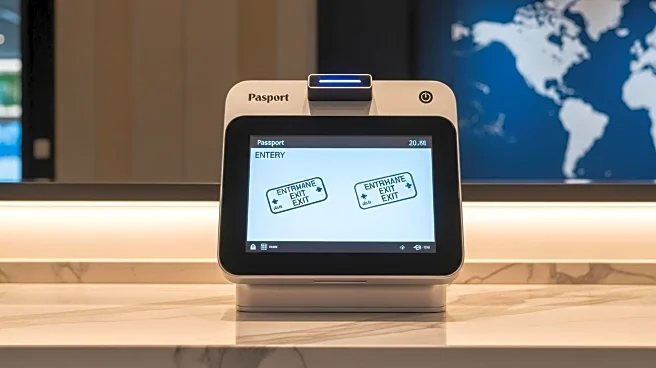What is the story about?
What's Happening?
The European Union is set to launch its new Entry/Exit System (EES) on October 12, which will require travelers from non-EU countries to scan their passports and register biometric data at self-service kiosks. This system aims to streamline border security across 30 European countries, including all EU states except Ireland, plus Iceland, Norway, Liechtenstein, and Switzerland. The EES will be rolled out over a six-month period. Additionally, the European Travel Information and Authorisation System (ETIAS) is scheduled to launch in late 2026, requiring citizens from 60 non-EU countries to obtain travel authorization before visiting the Schengen Area. Amid these changes, the Association of British Travel Agents (ABTA) and the EU have issued warnings about scams exploiting confusion over these new regulations, with over 60 fake websites claiming to sell the ETIAS visa waiver.
Why It's Important?
The implementation of the EES and ETIAS represents a significant shift in how border security is managed within the EU, potentially affecting millions of travelers from non-EU countries, including the UK, Australia, the US, and Canada. These systems are designed to enhance security and streamline entry processes, but they also introduce new complexities for travelers. The warnings about scams highlight the risks of fraud and data theft, emphasizing the need for travelers to be vigilant and informed about official procedures. The changes could impact travel agencies, airlines, and tourism industries, as they adapt to new requirements and address customer concerns.
What's Next?
As the EES launches, travelers will need to familiarize themselves with the new procedures and ensure compliance to avoid delays or issues at border crossings. The rollout of ETIAS in 2026 will further require travelers to obtain authorization before visiting the Schengen Area, adding another layer of preparation for international travel. Travel agencies and operators will likely increase efforts to educate customers and provide guidance on navigating these new systems. The EU and ABTA will continue to monitor and address fraudulent activities, ensuring travelers have access to accurate information and official channels for obtaining necessary travel authorizations.
Beyond the Headlines
The introduction of these systems may lead to broader discussions on privacy and data security, as biometric data collection becomes more prevalent in international travel. The EU's focus on enhancing border security could influence other regions to adopt similar measures, potentially reshaping global travel norms. Additionally, the emphasis on official channels for obtaining travel authorizations underscores the importance of digital literacy and cybersecurity awareness among travelers.
















